J Clin Neurol.
2018 Jan;14(1):16-21. 10.3988/jcn.2018.14.1.16.
Subjective Cognitive Complaints and Objective Cognitive Impairment in Parkinson's Disease
- Affiliations
-
- 1Department of Neurology, Yonsei University Wonju College of Medicine, Wonju, Korea. mlunoilu@hanmail.net
- 2Department of Neurology and Brain Research Institute, Yonsei University College of Medicine, Seoul, Korea.
- 3Department of Neurology, Bundang Jesaeng General Hospital, Seongnam, Korea.
- 4Severance Biomedical Science Institute, Yonsei University College of Medicine, Seoul, Korea.
- KMID: 2399594
- DOI: http://doi.org/10.3988/jcn.2018.14.1.16
Abstract
- BACKGROUND AND PURPOSE
Subjective cognitive complaints (SCCs) are very common in patients with Parkinson's disease (PD). However, the relationship between SCCs and objective cognitive impairment is still unclear. This study aimed to determine whether SCCs are correlated with objective cognitive performance in patients with PD.
METHODS
Totals of 148 cognitively normal patients, 71 patients with mild cognitive impairment (MCI), and 31 demented patients were recruited consecutively from a movement-disorders clinic. Their SCCs and cognitive performances were evaluated using the Cognitive Complaints Interview (CCI) and a comprehensive neuropsychological battery.
RESULTS
The CCI score increased with age, duration of PD, and depression score, and was inversely correlated with cognitive performance. The association between CCI score and performance remained significant after adjustment for the depression score, age, and duration of PD. The CCI score could be used to discriminate patients with dementia from cognitively normal and MCI patients [area under the receiver operating characteristics curve (AUC) of 0.80], but not patients with MCI or dementia from cognitively normal patients (AUC of 0.67).
CONCLUSIONS
SCCs as measured by the CCI are strongly correlated with objective cognitive performance in patients with PD. The CCI can also be used to screen for dementia in patients with PD.
MeSH Terms
Figure
Reference
-
1. Schrag A, Jahanshahi M, Quinn N. What contributes to quality of life in patients with Parkinson's disease? J Neurol Neurosurg Psychiatry. 2000; 69:308–312. PMID: 10945804.
Article2. Aarsland D, Bronnick K, Williams-Gray C, Weintraub D, Marder K, Kulisevsky J, et al. Mild cognitive impairment in Parkinson disease: a multicenter pooled analysis. Neurology. 2010; 75:1062–1069. PMID: 20855849.
Article3. Muslimovic D, Post B, Speelman JD, Schmand B. Cognitive profile of patients with newly diagnosed Parkinson disease. Neurology. 2005; 65:1239–1245. PMID: 16247051.
Article4. Hely MA, Reid WG, Adena MA, Halliday GM, Morris JG. The Sydney multicenter study of Parkinson's disease: the inevitability of dementia at 20 years. Mov Disord. 2008; 23:837–844. PMID: 18307261.
Article5. Lehrner J, Moser D, Klug S, Gleiß A, Auff E, Pirker W, et al. Subjective memory complaints, depressive symptoms and cognition in Parkinson's disease patients. Eur J Neurol. 2014; 21:1276–1284. e1277. PMID: 24909761.
Article6. Mills KA, Mari Z, Pontone GM, Pantelyat A, Zhang A, Yoritomo N, et al. Cognitive impairment in Parkinson's disease: association between patient-reported and clinically measured outcomes. Parkinsonism Relat Disord. 2016; 33:107–114. PMID: 27733275.
Article7. Sitek EJ, Sołtan W, Wieczorek D, Robowski P, SXławek J. Self-awareness of memory function in Parkinson's disease in relation to mood and symptom severity. Aging Ment Health. 2011; 15:150–156. PMID: 20924825.
Article8. Copeland JN, Lieberman A, Oravivattanakul S, Tröster AI. Accuracy of patient and care partner identification of cognitive impairments in Parkinson's disease-mild cognitive impairment. Mov Disord. 2016; 31:693–698. PMID: 27028432.
Article9. Castro PC, Aquino CC, Felício AC, Doná F, Medeiros LM, Silva SM, et al. Presence or absence of cognitive complaints in Parkinson's disease: mood disorder or anosognosia? Arq Neuropsiquiatr. 2016; 74:439–444. PMID: 27332067.
Article10. Gibb WR, Lees AJ. The relevance of the Lewy body to the pathogenesis of idiopathic Parkinson's disease. J Neurol Neurosurg Psychiatry. 1988; 51:745–752. PMID: 2841426.
Article11. Litvan I, Goldman JG, Tröster AI, Schmand BA, Weintraub D, Petersen RC, et al. Diagnostic criteria for mild cognitive impairment in Parkinson's disease: Movement Disorder Society Task Force guidelines. Mov Disord. 2012; 27:349–356. PMID: 22275317.
Article12. Kang YW, Jang SM, Na DL. Seoul Neuropsychological Screening Battery. 2nd ed. Seoul: Human Brain Research & Consulting Co.;2012.13. Hwang S, Kim J, Park G, Chey J, Hong S. Korean Wechsler Adult Intelligence Scale. 4th ed. Daegu: Korea Psychology Co. Ltd.;2012.14. Kim SG, Lee DY, Seo EH, Choo IH, Kim JW, Do YJ, et al. A Normative Study of an Executive Clock Drawing Task (CLOX) in Korean Elderly. J Korean Neuropsychiatr Assoc. 2009; 48:437–446.15. Kang Y, Na DL, Hahn S. A validity study on the Korean Mini-Mental State Examination (K-MMSE) in dementia patients. J Korean Neurol Assoc. 1997; 15:300–308.16. Kang YW, Park JS, Yu KH, Lee BC. A reliability, validity, and normative study of the Korean-Montreal Cognitive Assessment (K-MoCA) as an instrument for screening of Vascular Cognitive Impairment (VCI). Korean J Clin Psychol. 2009; 28:549–562.17. Dujardin K, Duhamel A, Delliaux M, Thomas-Antérion C, Destée A, Defebvre L. Cognitive complaints in Parkinson's disease: its relationship with objective cognitive decline. J Neurol. 2010; 257:79–84. PMID: 19690907.
Article18. Dubois B, Burn D, Goetz C, Aarsland D, Brown RG, Broe GA, et al. Diagnostic procedures for Parkinson's disease dementia: recommendations from the movement disorder society task force. Mov Disord. 2007; 22:2314–2324. PMID: 18098298.
Article19. Rami L, Mollica MA, García-Sanchez C, Saldaña J, Sanchez B, Sala I, et al. The Subjective Cognitive Decline Questionnaire (SCD-Q): a validation study. J Alzheimers Dis. 2014; 41:453–466. PMID: 24625794.
Article20. Rattanabannakit C, Risacher SL, Gao S, Lane KA, Brown SA, McDonald BC, et al. The Cognitive Change Index as a measure of self and informant perception of cognitive decline: relation to neuropsychological tests. J Alzheimers Dis. 2016; 51:1145–1155. PMID: 26923008.
Article21. Hong JY, Lee JE, Sohn YH, Lee PH. Neurocognitive and atrophic patterns in Parkinson's disease based on subjective memory complaints. J Neurol. 2012; 259:1706–1712. PMID: 22289965.
Article22. Kehagia AA, Barker RA, Robbins TW. Neuropsychological and clinical heterogeneity of cognitive impairment and dementia in patients with Parkinson's disease. Lancet Neurol. 2010; 9:1200–1213. PMID: 20880750.
Article
- Full Text Links
- Actions
-
Cited
- CITED
-
- Close
- Share
- Similar articles
-
- Subjective Cognitive Complaints in Cognitively Normal Patients With Parkinson’s Disease: A Systematic Review
- Reliability and Validity of the Subjective Cognitive Complaints Questionnaire for Parkinson’s Disease (SCCQ-PD)
- Constipation is Associated With Mild Cognitive Impairment in Patients With de novo Parkinson’s Disease
- Group Differences in Subjective Memory Complaint Content: Late Life Depression and Mild Cognitive Impairment
- Accuracy of Machine Learning Using the Montreal Cognitive Assessment for the Diagnosis of Cognitive Impairment in Parkinson’s Disease



